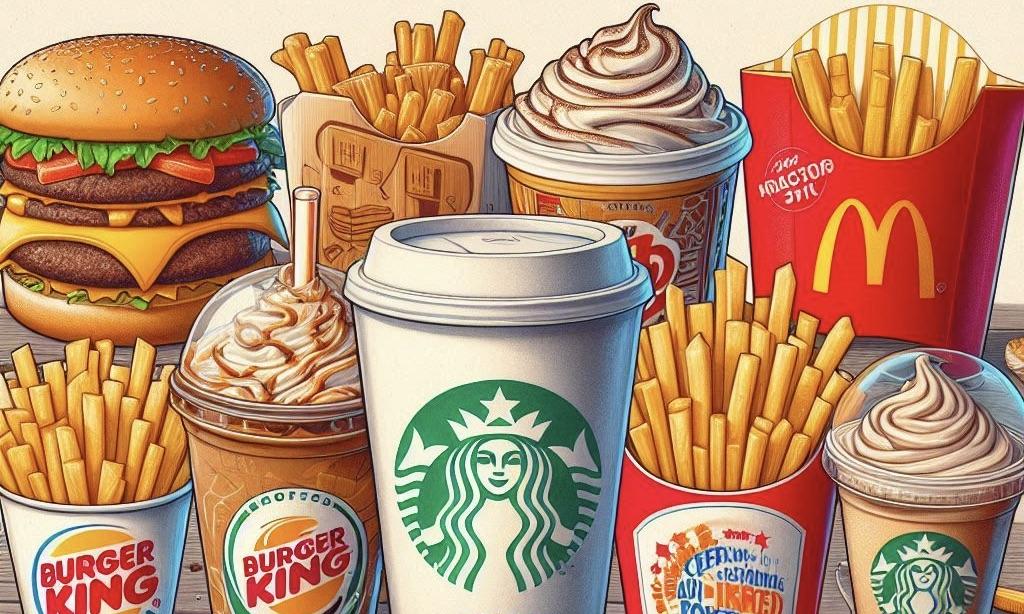Concerns over the potential health impacts of fast food have long been a subject of public debate. Now, rumors are swirling that meals from popular chains like McDonald’s, Burger King, Starbucks, and Dunkin’ could be linked to acne breakouts, especially among younger consumers. While the connection between diet and skin health has been studied for years, new speculation has reignited discussions about how fast-food staples may contribute to poor skin conditions, including acne.
Acne, a common skin condition that affects millions of people, is often influenced by various factors such as genetics, stress, and hormone fluctuations. However, some experts argue that diet plays a significant role in triggering breakouts. Fast food, which is typically high in refined carbohydrates, sugars, and unhealthy fats, is often pointed to as a potential culprit for aggravating skin conditions. Foods rich in these ingredients can cause spikes in blood sugar and insulin levels, which may lead to increased sebum production—a known factor in acne development.
At chains like McDonald’s, menu items such as fries, burgers, and soft drinks are packed with refined carbs and sugars. These foods are known to cause blood sugar spikes that may lead to inflammation in the body, which could exacerbate acne. Additionally, fried foods, which are a staple at McDonald’s and other fast-food establishments, are often cooked in oils that may contribute to skin problems by increasing the body’s overall oil production.
Burger King also offers similar fare, with burgers, fries, and sugary beverages forming the core of its menu. The high glycemic index (GI) of these foods—meaning they cause a rapid rise in blood sugar—has been linked by some studies to worsened acne in people who are already prone to breakouts. The hormones triggered by high-GI foods can stimulate oil production in the skin, potentially clogging pores and leading to acne.
At Starbucks, while coffee itself may not cause acne, some of the chain’s popular beverages, laden with sugar and dairy, could be problematic. Frappuccinos, mochas, and other high-calorie coffee drinks often contain large amounts of sugar, which can promote inflammation and hormone fluctuations, two factors that are closely tied to acne. Dairy, too, has been speculated to worsen skin conditions in some individuals, as certain studies suggest a link between milk consumption and acne.
Similarly, Dunkin’ offers a range of sugary drinks and pastries that are high in refined carbs. Donuts and other breakfast treats, combined with sugary coffee drinks, could cause the same insulin spikes that lead to potential skin issues. The combination of sugar and dairy in these offerings may contribute to inflammation, creating an environment in the body that can exacerbate skin problems.
While some research suggests a connection between fast food and acne, it’s important to note that these claims remain debated within the scientific community. Genetics, lifestyle, and personal skincare routines play a significant role in an individual’s likelihood of experiencing acne. Fast food may not be the sole contributor, but for those who notice a link between their diet and skin flare-ups, moderating intake of high-sugar, high-fat foods may be a wise step.



 Rio Tinto Shares Hit Record High After Ending Glencore Merger Talks
Rio Tinto Shares Hit Record High After Ending Glencore Merger Talks  Sony Q3 Profit Jumps on Gaming and Image Sensors, Full-Year Outlook Raised
Sony Q3 Profit Jumps on Gaming and Image Sensors, Full-Year Outlook Raised  Once Upon a Farm Raises Nearly $198 Million in IPO, Valued at Over $724 Million
Once Upon a Farm Raises Nearly $198 Million in IPO, Valued at Over $724 Million  The American mass exodus to Canada amid Trump 2.0 has yet to materialize
The American mass exodus to Canada amid Trump 2.0 has yet to materialize  American Airlines CEO to Meet Pilots Union Amid Storm Response and Financial Concerns
American Airlines CEO to Meet Pilots Union Amid Storm Response and Financial Concerns  Nvidia, ByteDance, and the U.S.-China AI Chip Standoff Over H200 Exports
Nvidia, ByteDance, and the U.S.-China AI Chip Standoff Over H200 Exports  SpaceX Pushes for Early Stock Index Inclusion Ahead of Potential Record-Breaking IPO
SpaceX Pushes for Early Stock Index Inclusion Ahead of Potential Record-Breaking IPO  TSMC Eyes 3nm Chip Production in Japan with $17 Billion Kumamoto Investment
TSMC Eyes 3nm Chip Production in Japan with $17 Billion Kumamoto Investment  Stuck in a creativity slump at work? Here are some surprising ways to get your spark back
Stuck in a creativity slump at work? Here are some surprising ways to get your spark back  TrumpRx Website Launches to Offer Discounted Prescription Drugs for Cash-Paying Americans
TrumpRx Website Launches to Offer Discounted Prescription Drugs for Cash-Paying Americans  Weight-Loss Drug Ads Take Over the Super Bowl as Pharma Embraces Direct-to-Consumer Marketing
Weight-Loss Drug Ads Take Over the Super Bowl as Pharma Embraces Direct-to-Consumer Marketing  Every generation thinks they had it the toughest, but for Gen Z, they’re probably right
Every generation thinks they had it the toughest, but for Gen Z, they’re probably right  6 simple questions to tell if a ‘finfluencer’ is more flash than cash
6 simple questions to tell if a ‘finfluencer’ is more flash than cash  Uber Ordered to Pay $8.5 Million in Bellwether Sexual Assault Lawsuit
Uber Ordered to Pay $8.5 Million in Bellwether Sexual Assault Lawsuit  Missouri Judge Dismisses Lawsuit Challenging Starbucks’ Diversity and Inclusion Policies
Missouri Judge Dismisses Lawsuit Challenging Starbucks’ Diversity and Inclusion Policies  Disaster or digital spectacle? The dangers of using floods to create social media content
Disaster or digital spectacle? The dangers of using floods to create social media content 































